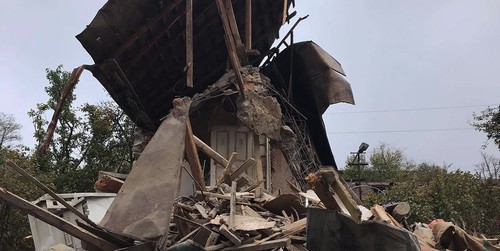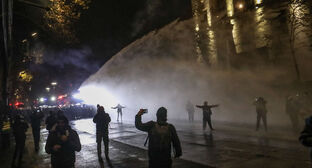
14 November 2020, 12:48
Rights defenders treat new reconciliation in Karabakh conflict as fragile
The participation of international structures in resolving the Karabakh crisis is justified, but the world community is behaving passively, Svetlana Gannushkina, a human rights defender, believes. For a long-term peace, guarantees of the preservation of the Armenian enclave in Nagorno-Karabakh are needed, but the international community will not seek concessions from Baku, Oleg Orlov, the head of the board of the Human Rights Centre (HRC) "Memorial", is sure.
The "Caucasian Knot" has reported that Russian peacemakers, following the concluded tripartite agreement on ceasefire in the conflict zone, have taken control over the Lachin corridor connecting Karabakh with Armenia, by setting up temporary posts there. On November 12, the peacemaking battalion of the Russian Ministry of Defence (MoD) took control of Stepanakert; 10 observation posts were set up along the contact line.
On November 10, an agreement between Russia, Azerbaijan, and Armenia on the cessation of the hostilities in Nagorno-Karabakh came into force. According to the agreement, Azerbaijan takes over the territories of Nagorno-Karabakh captured during the hostilities and gets the so-called "Security Belt", that is, returns the territories of five districts adjacent to Karabakh.
The UN observation missions and peacemaking forces should be involved in the Karabakh process; it will help stabilizing the efforts to achieve peace in the region, Svetlana Gannushkina, who is also the head of the "Civil Assistance" Committee, is sure.
"I don't think that Russian peacemakers only are the best option. Mixed peacemaking forces are needed; moreover that we have experience when Russian peacemakers took one side in the conflict," Ms Gannushkina told the "Caucasian Knot" correspondent.
At the same time, she admits that in recent years international organizations have failed to play any significant role in resolving conflicts, and are increasingly demonstrating their helplessness.
The recent new round of Karabakh conflict was expected since the parties stuck to their positions; there was no progress towards compromise, and the UN has self-withdrawn from resolving the problem, Svetlana Gannushkina believes.
"It was clear that someday it would explode. Now, we see no UN's resolute actions either. This organization ceases to be active in the international arena; it is dragging behind the situation, instead of going in front thereof," she has concluded.
Another war in the Karabakh conflict zone is over, but the situation is extremely unstable since the international community is avoiding resolving the contradictions in Southern Caucasus and agrees putting responsibility for regional peace on Vladimir Putin, says Oleg Orlov, the head of the board of the HRC "Memorial".
He believes that the joining of the remaining part of Nagorno-Karabakh, not controlled by Azerbaijani authorities, to Armenia could be a possible way to long-standing peace, provided that Azerbaijan agrees to it.
"Unfortunately, the ideal is unattainable. In the foreseeable future, Azerbaijan won't agree to it ... It would be possible to recognize Nagorno-Karabakh as some kind of special autonomous entity. But instead, Azerbaijan also should be given something very significant. So far, Aliev wouldn't even hear listen about it. Who, apart from Armenia, is ready to raise this issue for discussion? The international community will now again forget about this region – everyone is happy that all the responsibility for peace there is now on Putin," Mr Orlov has concluded.
This article was originally published on the Russian page of 24/7 Internet agency ‘Caucasian Knot’ on November 14, 2020 at 00:29 am MSK. To access the full text of the article, click here.
Author: Magomed Tuayev Source: CK correspondent




